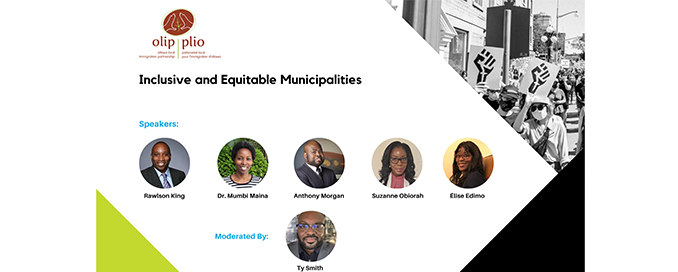Inclusive & Equitable Municipalities
December 17, 2021Municipalities play an increasingly important role in key social policy, investment, and programming areas, ranging from economic development, transportation, housing, infrastructure, public health, social services, parks and recreation, and policing. Municipalities, as the government closest to the people, assume the important role of speaking for the needs of communities with higher levels of government. How is this crucial role of municipalities being leveraged to address inequities?
To answer this key question, this panel session discussed the approaches and plans being taken by key Canadian municipalities on their path to addressing systemic and institutionalized racism, which is impeding the achievement of equitable results for all residents. Through a series of presentations, we gained insights on the challenges and successes being encountered as municipalities embark on change pathways towards the achievement of equity for all residents, in the scope of their areas of jurisdiction.
Speakers and Topics:
- Mumbi Maina, Social Planner, City of Vancouver on Vancouver’s New Equity Framework & Plans
- Anthony N. Morghan, Manager, Confronting Anti-Black Racism (CABR) Unit, City of Toronto on The Implementation of the Toronto Action Plan to Confront Anti-Black Racism.
- Elise Edimo, Project Officer, Francophone Immigration Support Network in Eastern Ontario, on the Inclusion & Civic Participation of Francophone Immigrants in Hawkesbury
- Suzanne Obiorah, Director of the Gender and Race Equity, Inclusion, Indigenous Relations and Social Development, City of Ottawa on Advancing Equity across Municipal Domains and the Development of a Women and Gender and an Anti-Racism Strategy and Plan
Moderator: Ty Smith, Senior Director, Diversity, Inclusion and Leadership, the Federation of Canadian Municipalities.
Selected Highlights:
- As the first speaker of the panel, Mumbi described Vancouver’s journey in developing the city’s Equity Framework, centered on a racial justice and Indigenous rights approach, as a guide for how the city of Vancouver plans and advances equity across municipal domains. Although equity policies and strategies were developed, the city needed a common understanding or definition on what equity meant. In an effort to have a shared understanding of equity, the city developed a vision to be a place where those who are most marginalised are not excluded from care and opportunity for flourishing, but rather they are systematically prioritized.
- As Mumbi described, in this work, equity was both a process and an outcome. The process describes the way we do the work matters and institutional culture around our equity efforts. The outcomes focus on the disparities that exist across different sectors. Through detailed examples, she outlined how the city of Vancouver worked collaboratively towards organizational transformation through the development of the Equity Framework. It is clear this framework is an important milestone and roadmap for municipalities to emulate.
- Representing the City of Toronto, Anthony outlined the ways this municipality has advanced equity within the city’s jurisdiction, the key milestones of this journey, the successful implementation of the Toronto Action Plan to Confront Anti-Black Racism, and the next steps they have planned to continue this work.
- As a small town with one of the largest Francophone communities, Elisa described the value and implementation of a federal initiative focused specifically on Francophone immigrant inclusion and integration, as a key resource to advancing inclusive cities. As the Project Officer responsible for this Initiative at the Francophone Immigration Support Network in Eastern Ontario, she hopes the initiative will be successful and replicated across Eastern Ontario.
- Across diverse portfolios, Suzanne outlined how the City of Ottawa has advanced equity within the city’s jurisdiction by embedding equity lens in employment, planning and strategy, service provision, funding structures, and the development of a Women and Gender and an Anti-Racism Strategy and Plan. She advocates for integrating equity frameworks into planning and service provision and embedding accountability throughout this process.
- The centrality of having a shared language and understanding of what we mean by equity, examining our privileges and positions, and explore the histories that have been left out. The panelists highlighted keys ways to bring together municipal leadership, community voices, and consultants with lived experience to bridge a shared understanding of equity.


 We are very pleased to have done the “Opportunity Cost of Not Investing in Interpretation” report – it is so important to have clarity on these challenges and…
We are very pleased to have done the “Opportunity Cost of Not Investing in Interpretation” report – it is so important to have clarity on these challenges and…